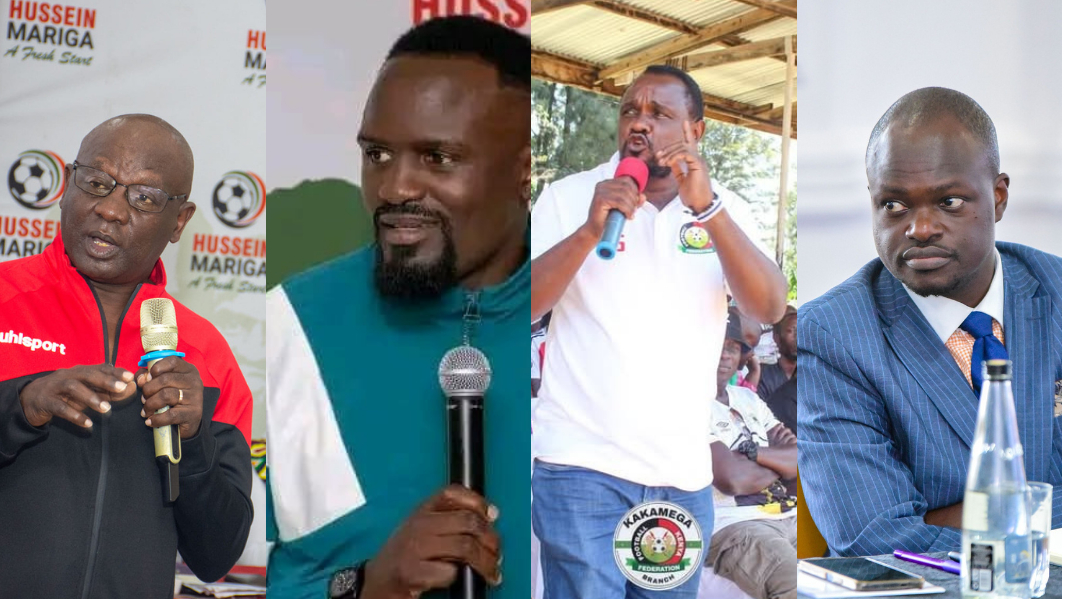Kenyan football has long struggled under the weight of poor leadership, financial mismanagement, and policies that fail to prioritize the welfare of players.But for the first time in an eternity, the Football Kenya Federation (FKF) is showing promise under the stewardship of individuals who have lived the game—footballers who understand its struggles, triumphs, and the realities that players face both on and off the pitch.Team Hussein, the current FKF leadership, has brought in some of the biggest names in Kenyan football, men who once graced local and international stages and who now have the responsibility of shaping the game they once played.##NAJAVA_MECA_8736679##Among them is McDonald Mariga, the first and only Kenyan to lift the UEFA Champions League trophy.His journey from playing in local leagues for Pipeline, Tusker, and Ulinzi to securing a spot in top European clubs like Inter Milan, Parma, and Real Oviedo is a story of resilience and hope for young players in the country.If there is anyone who understands what it takes to make it as a Kenyan footballer, it is Mariga. His experience can be the foundation for policies that will create opportunities for young talents to follow in his footsteps as he sits on the youth development committee.Kenyan midfielder McDonald Mariga has rejoined Parma pic.twitter.com/tn6XYbcp06— Jeff Kinyanjui (@_JeffKinyanjui) September 4, 2014 Harold Ndege, FKF’s Chief Executive Officer, is another name deeply rooted in Kenyan football.He was a key player for Tusker, helping them secure two FKF Premier League titles and two CECAFA Club Cups.With a background in finance, and having earned a Master’s degree in that field, he brings a mix of football knowledge and financial expertise—something FKF has desperately needed in the past, given its history of financial scandals and mismanagement.His role will be crucial in ensuring that funds meant for player development and league operations are not lost in bureaucratic confusion.Former Tusker defender appointed FKF CEODan Shikanda, a former left winger for the AFC Leopards and Gor Mahia, now sits on the FKF National Executive Committee (NEC) as Nairobi’s representative.He also chairs AFC Leopards, a club he once played for, making him one of the few football administrators who have walked the journey of a player before stepping into leadership.His education as a veterinary doctor from the University of Nairobi speaks to his discipline and ability to juggle multiple responsibilities—traits that could be instrumental in reviving Kenyan football.##NAJAVA_MECA_8736158##Then there is Peter Kamau Kasskass, the Lower Rift NEC representative, whose playing history includes stints at Eldoret KCC, Kisumu Posta, and Shabana.He has also worked as a coach and football instructor and played an active role in the Kenya Legends Support Initiative.His experience at the grassroots level gives him a perspective that many before him lacked—a true understanding of what is needed to grow football from the grassroots.Former AFC Leopards captain joins Mathare United on a short term dealWith these individuals in key positions, FKF has a leadership that should, in theory, deliver results. But history has shown that having footballers in management does not always guarantee success.Kenyan footballers have suffered for years. Many players, after giving their best years to the sport, find themselves struggling to make ends meet once their playing days are over.The most heartbreaking cases are those of former stars who were once celebrated but are now languishing in poverty.Former AFC Leopards midfielder Charles Okwemba, a player who once carried the weight of the team on his shoulders, has often spoken about the struggles that many ex-players face, particularly in transitioning to life after football.“It is very important to look at your life after football. It is not about having a choice. As much as you concentrate on football and give it 100 percent, you must have something on the side. Football is a good career, but things happen, and you need to have another plan.”FKF commits resources to ensure Rising Stars shine at 2025 AFCON U-20Eric Masika, a talented defender who played for Gor Mahia and the AFC Leopards, is another sad example. After his career ended prematurely, he was forced to venture into casual labour just to survive. The game that once gave him so much ended with most of what he had.There is also the tragic case of former Kenyan international Kevin Ochieng, who once played for Mathare United and Gor Mahia but ended up in distress after retirement.It was a great honor and pleasure to host football legend and former Harambee Stars goalkeeper Matthew Ottamax Owino at our head offices.The discussions with president @situmajames14 focused on the plights JaGoal has been going through…Read MORE⤵️https://t.co/u8YileZjTg pic.twitter.com/KCdCSeueiS— KEFWA (@kefwaofficial) February 24, 2025 These stories serve as painful reminders of the gaps that exist in player welfare and post-career support.If the current FKF leadership fails, it will not just be another failed regime—it will be a betrayal to the very people they once played alongside.With their unique insight into the game, these former footballers have an opportunity to address long-standing issues: the lack of structured youth development programs, the constant struggles of community clubs, the failure to secure stable funding, and the absence of proper medical insurance for players.##NAJAVA_MECA_8736246##This is their moment to redefine Kenyan football. It is their chance to ensure that the next generation does not suffer the same fate as those who came before.They have worn the jerseys, played on the pitches, and felt the struggles firsthand. Now, they must ensure that no Kenyan footballer ever has to walk that lonely road again.The time for change is now, and failure is simply not an option.New Gor Mahia head coach reveals his concern ahead of Mashemeji Derby

